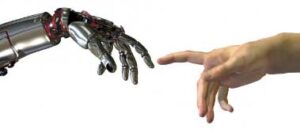Raymond Kurzweil makes a fascinating observation: “Computers are about one hundred million times more powerful for the same unit cost than they were a half century ago. If the automobile industry had made as much progress in the past fifty years, a car today would cost a hundredth of a cent and go faster than the speed of light.”1
Kurzweil, inventor of some of the most innovative technology of our era, has been called “Edison’s rightful heir ” and, among other awards, received the National Medal of Technology and Innovation. A graduate of MIT and recipient of nine honorary doctorates, he is also the author of The Age of Intelligent Machines.
It has been suggested that our next evolutionary leap will come about through our merging with our technology. Indeed, as Kurzweil points out, “technology is the continuation of evolution by other means.” But whereas cosmological evolution proceeded at a glacier-like pace, and although biological evolution considerably speeded up the process, technological evolution, especially in the domain of computers, accelerates at an increasingly exponential rate.
According to Kurzweil, at some point in the not-too-distant future, maybe as early as 2099, we will enter the transhuman or posthuman era. If we wish to keep up with our rapidly evolving technology, it will be necessary to scan our brains, say farewell to our carbon-based flesh, and upload our minds into a faster and more powerful computational unit. In other words: a machine.

By then, however, Kurzweil says that computers will have evolved to such an extent that they will claim to have consciousness, emotions, and spiritual experiences. Some may even claim to be enlightened, and will be meditating and regularly attending virtual houses of worship. Towards the end of the 21st century, with the widespread use of neural-implant technology by humans, and with machine-based computers modeled more and more on human intelligence, it will become increasingly difficult to tell humans from computers. Those humans who have no neural implants will not be capable of entering into meaningful dialogue with those who do. In speaking of our descendants and our technology, there is really no distinction to be made.
And when we do upload our minds, so the prediction goes, we will achieve technological immortality—cyberlife everlasting. Just be sure to make frequent backups!
Note
1. Raymond Kurzweil, The Age of Spiritual Machines: When Computers Exceed Human Intelligence, p. 25.
HyC